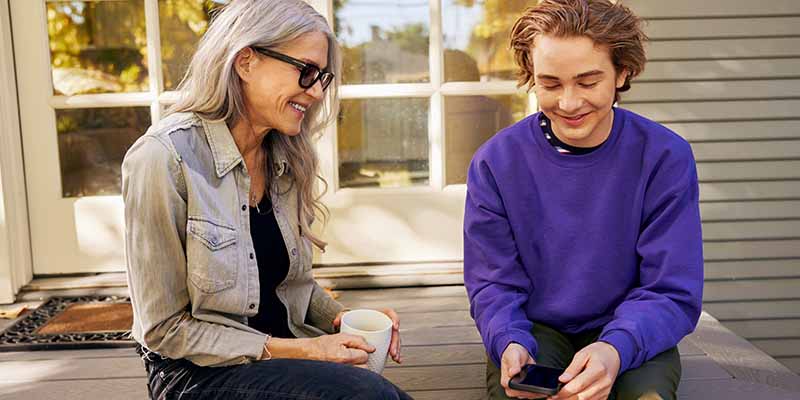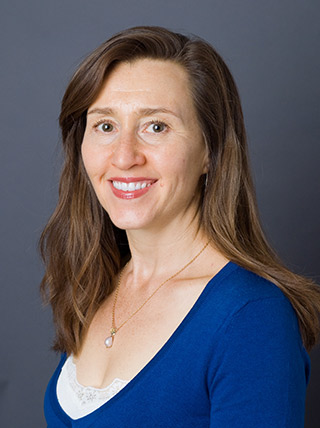
By Jill Pope, Senior Scientific Editor
 Frances Lynch, PhD
Frances Lynch, PhD
In July 2024, STEP-UP, a new CHR study, enrolled its first participant at an Oregon community health clinic. If assigned to the STEP-UP program, the young person will attend a series of eight to twelve online sessions with their parent and a therapist to learn new skills to manage depression or anxiety.
Enrolling in a study like this one might be the best shot a young person has at getting treatment. Nearly 1 in 3 youth report clinically significant anxiety; 1 in 10 report depression by the end of adolescence. However, only 1 in 5 youth with anxiety, and only 2 in 5 youth with depression, report receiving any treatment. Research also shows substantial disparities in who gets mental health care: young people who are Hispanic or who have social risks, such as financial or housing insecurity, are significantly less likely to receive mental health services than their peers.
The STEP-UP study is co-led by CHR Distinguished Investigator Frances Lynch, PhD, a health economist who focuses on children’s mental health, and her colleague, V. Robin Weersing, PhD, the clinical psychologist who developed the STEP-UP intervention and a professor at San Diego State University. The five-year study, funded by the National Institutes of Mental Health, is the latest in a long and productive working relationship between the two investigators. It builds on 17 years of collaboration in developing, testing, and refining a treatment program that can treat children and adolescents with anxiety and depression—something they both care very much about.
The STEP-UP Study: Brief Behavioral Therapy for Anxiety and Depression
The STEP-UP study will test a brief behavioral therapy program for youth with anxiety and depression delivered in primary care. A total of 220 young people ages 8 to 17 will enroll. Participants will be assigned at random to either receive the STEP-UP program or referral to treatment in the community. Participants will come from six OCHIN health clinics in Oregon, Washington, and California that serve a diverse population of uninsured and underinsured patients. All participating families will be screened for social risks and offered navigation to community resources.
Each child assigned to the STEP-UP program, along with their parent (or another adult) will meet for a series of video visits with a provider from their pediatrician’s office. Dr. Weersing and her colleagues will train staff in six OCHIN primary care clinics to deliver the program. These staff may be therapists, social workers, nurses, or the person in the clinic who normally would refer a young person to treatment.
The program, developed by Dr. Weersing and her colleagues, is considered “transdiagnostic” because it targets both anxiety and depression. The program focuses on helping young people change the avoidance behaviors that are common to both conditions using the techniques of exposure and behavioral activation.
Young people learn to approach things they are fearful about, such as talking to a teacher about not understanding something, by breaking actions down into smaller, more manageable steps they can safely try. After learning a new skill during a session, the young person practices it in the real world. Successes on these small steps can build and help youth overcome fears and engage in activities that can improve their emotions.
Because STEP-UP is designed for a child and parent to do together, says Lynch, “Both are learning, and the parent or adult in their life is learning how to help the child.” There are six core program modules, but the exact number of sessions will depend on the young person. “Some kids need more practice with the skills than others,” she says.
The Long Road to Testing in Community Clinics
Weersing, Lynch, and colleagues first tested a version of this program in a randomized controlled trial that ran from 2010 to 2014. A total of 185 participants ages 8 to 17 were recruited from pediatric clinics in San Diego, California, and Pittsburgh, Pennsylvania. They attended 8-12 weekly in-person sessions delivered by master’s-level therapists.
Their findings, published in JAMA Psychiatry, were impressive: 56.8% of young people receiving the program saw improvement, compared with 28.2% of those referred to outside treatment. The effects were especially strong for Hispanic participants, a promising result for reducing disparities. A journal commentary praised the team’s work, saying they had set “a course toward clarity, brevity, and impact in the psychosocial care of youth in pediatric primary care.”
While these results were encouraging, the original program relied on weekly face-to-face sessions with a therapist, a resource-intensive design that was not practical to implement across all health care settings. The original study also enrolled only insured youth.
With a desire to make treatment widely available regardless of care setting or insurance status, the team adapted the program into a video visit format and translated all study materials into Spanish. A pilot study showed this new version of the program was feasible and acceptable in community health clinics—an important step. However, it still had to be shown effective in those settings, and questions remained about how best to implement and sustain the program.
The current study will test how well the program reduces symptoms of anxiety and depression, compared to those among youth referred for mental health treatment in the community. The study team will interview a small number of participants to understand their experiences with the program, as well as 2-3 participating staff members per clinic. What they learn will inform future improvements to the program. If the current trial shows the STEP-UP program to be effective, Drs. Lynch and Weersing next hope to spearhead a broader implementation trial to learn what it would take for organizations to launch and maintain STEP-UP for their patients as part of their daily practice.
Big Potential Public Health Impact
Lynch and Weersing are hopeful about the program’s potential to expand access to treatment and reduce disparities. They believe the family component may be one reason the intervention has worked well with Hispanic families and are eager to see if the program proves effective among the youth and families at OCHIN clinics. The most important thing about the study, Lynch says, is that it could help treatment reach more kids who need help. “Young people getting care at these clinics often have little or no access to mental health services,” says Lynch. “It’s very hard to get kids into treatment. They could be waiting for months. Helping a lot of kids function even a bit better translates into a big public health impact. That’s really important.”